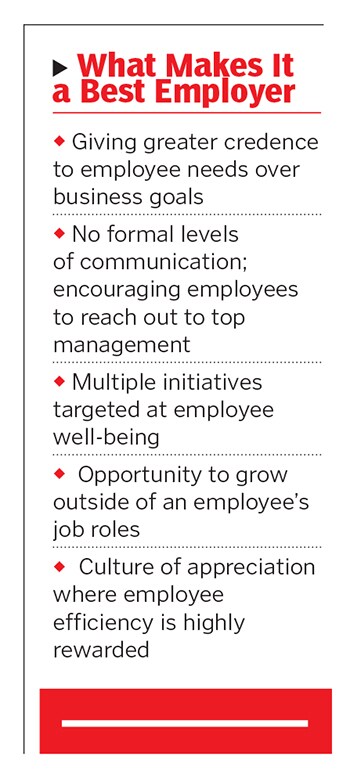India's Best Employers: Olam International, putting people first
Olam International has created a strong foothold in India by prioritising the needs of its workforce over business targets


 We don’t believe in restricting our employees to their job roles, says Suresh Sundararajan, MD and global head, Olam International
We don’t believe in restricting our employees to their job roles, says Suresh Sundararajan, MD and global head, Olam International
Image: Rendy Aryanto[br]Among the numerous roadblocks brought in by the Covid-19 pandemic, keeping employee morale high was the biggest challenge that organisations across sectors had to overcome. The companies that prioritised employee needs over business goals in an anomalous year like 2020 were not only able to improve employee effectiveness, but also, in the process, achieve business targets. Olam International, an agricultural commodity trader, is an example of one such organisation that followed the ‘employee first’ approach and was able to stay afloat even when the agricultural supply chain was disrupted by the pandemic.
“We believe employees are our competitive advantage, and during the pandemic, our primary focus was employee safety and how to not let the pandemic impact their work and well-being,” says Suresh Sundararajan, managing director and global head, Olam International.
The group, headquartered in Singapore, has two business verticals: Olam Global Agri that has multiple agri-businesses like supplying food, feed and fibre to meet the rising demand of protein-based diets, particularly in Asian and African countries. The second vertical is Olam Food Ingredients that sells products like cocoa, coffee, dairy, nuts and spices. Olam Information Services (OISL) is a subsidiary headquartered in Chennai that manages the IT and global business services across its presence in 65 countries in Asia, Africa, Europe and the US.
Olam started operations in 1989 in Nigeria and presently operates in more than 60 countries worldwide. In a span of 13 years of operations in India, the company has more than 1,500 employees.
The pandemic was not the first time the company dealt with a crisis in the country. In 2015, when flooding in Chennai halted businesses across the city, the company was proactive in providing support to its employees and came up with ways to continue business operations. “We’ve learnt to always be prepared with a BCP [Business Continuity Plan]. When the floods disrupted life, we quickly took multiple steps to support our staff and their families, and that’s a major reason why we were able to resume operations sooner than other businesses,” says Suresh.Olam has an attrition rate of 7.2 percent, as opposed to the industry average of 15 percent, according to Deloitte India’s Workforce and Increment Trends Survey 2020. Arvind Raj, vice president and HR head for Olam Information Services, says an employee-centric business approach has led to increased employee retention. “We value employee feedback and have several policies and initiatives that provide them a platform to express their opinions. That, coupled with our policy of no formal communication channel, anyone can reach out to any team member, irrespective of their positions. This inculcates the value of belongingness in our workforce which has been crucial in improving effectiveness,” says Arvind, adding that their monthly employee trust surveys have yielded a 92 percent trust score, indicating the level of employee satisfaction.
In response to Covid-19, several initiatives were introduced by the company, like the pandemic loan policy and the employee assistance programme that offers a range of self-help resources and personalised help from professional counsellors covering an array of aspects like work, health, mental well-being, and relationships.
“A significant amount of resources are invested in our talent, as the pandemic brought along newer skills requirement for the employees. Upskilling became our focus and so we invested in training, learning and development more than before,” says Suresh. The multiple initiatives—from counselling to free online courses to family support programs—improved employee productivity, he adds.
Olam did not reduce hiring during the pandemic. While many businesses had to cut down on their expenditure, the company has had no layoffs or salary cuts.
“Our focus has been to generate as much employment as possible in a crisis like this. Instead of the walk-in drives in the pre-Covid era, we now have the ‘login is the new walk in’ drives to hire talent digitally,” says Arvind.
According to human resources and management consultancy Kincentric, employee engagement at Olam is at 86 percent, while the industry average is 66 percent. Suresh attributes this success to the flexibility offered by the company, “We don’t believe in restricting our employees to their job roles. There are ample opportunities for them to grow even outside of their field of expertise. We have experimented with people based on their potential, capabilities, and knowledge they have in a particular domain, and that has helped generate innovative ideas and better results,” he says.
“Olam operates in diverse business setups across 65 countries, and it is exciting to see how OISL in India has become a true melting pot of global working cultures, diverse businesses and complex supply chains within the group. The employees are empowered to reinvent the methods of operations, and I think that will lead the company to set a benchmark for how to nurture a strong employee base,” says Sumeet Salwan, partner at Deloitte India, who has worked with Olam for over seven years and has helped the company set up and expand Olam Information Services in India.
First Published: Mar 23, 2021, 11:48
Subscribe Now